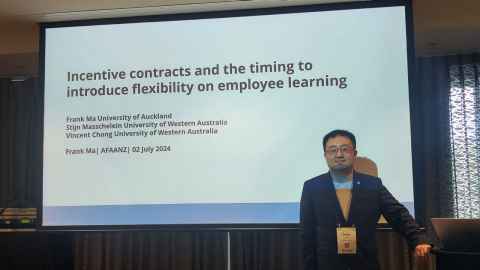Early autonomy over AI boosts employee motivation
16 September 2024
At what stage should people be given the power to overrule AI in the workplace? New research suggests sooner is better.

Giving employees the power to overrule AI decisions from day one boosts motivation and enhances learning, according to a new study.
"Imagine you're a financial specialist at a bank," says Business School lecturer Dr Frank Ma. "You input details for a mortgage application, and the AI system recommends declining it. While the system is based on hard data, as a human, you can recognise nuances—'soft' information—that AI can miss. This is where the ability to overrule the system is beneficial."
Dr Ma, along with researchers Stijn Masschelein and Vincent Chong from the University of Western Australia, conducted a series of online tasks with 161 participants. The tasks were designed to simulate real-world scenarios in sectors where AI is utilised in decision making.
Their findings suggest that when employees are empowered to overrule AI decisions early on, they become more motivated and better equipped to understand complex tasks.
The study also looked at the impact of incentive schemes, finding that combining early autonomy and incentive pay creates an environment where employees are more engaged and learn faster.

“Whether and when to override AI decisions is already a big issue in industries including banking and manufacturing, and it’s going to become one in many others that use algorithms for managerial decision-making," says Ma.
“Overall, our study shows that giving employees the power to have the final say over AI early on is critical to their learning. Humans can pick up on nuances that artificial intelligence can’t, so people need the power to make the final call.”
Giving employees immediate flexibility, he says, provides more opportunities to override system decisions, and incentive pay ensures that employees put more effort into making the final call accurately.
“Employees with incentive schemes and immediate flexibility get a better understanding of their roles and improve their performance. We believe this is due to developing a more in-depth understanding of how the computer system or AI generates its decision.”
The study also shows that delaying this autonomy has a detrimental effect on employee motivation, potentially limiting learning and performance.
Titled "Incentive Contracts and the Timing to Introduce Flexibility on Employee Learning", the study won the Best Paper Award (Management Accounting) at the 2024 Accounting and Finance Association of Australia and New Zealand conference.
Media contact:
Sophie Boladeras, media adviser
M: 022 4600 388
E: sophie.boladeras@auckland.ac.nz